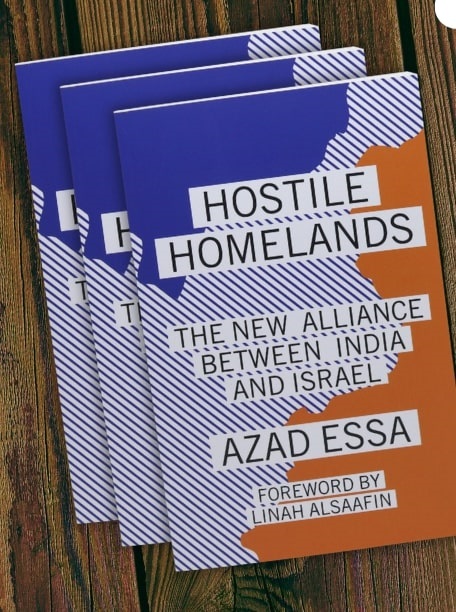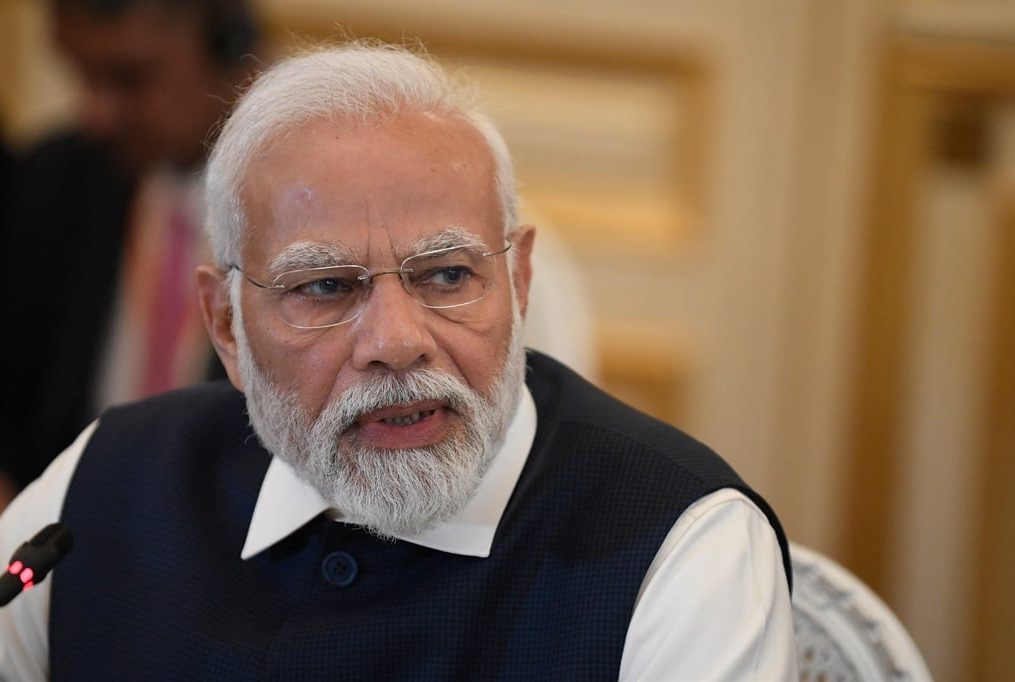News24 | EXCERPT | Azad Essa’s ‘Hostile Homelands’: The rise of the ethnocracy in India
Under Narendra Modi, India has changed dramatically. ‘Hostile Homelands’ written by Azad Essa examines the historical context of India’s relationship with Israel, examines the origins of Zionism and Hindutva; India’s changing position on Palestine; and the countries’ growing military-industrial relationship from the 1990s. Here is an excerpt from the book entitled, ‘The Rise of the Ethnocracy’.
In late December 2021, Hindu nationalists and supremacists gathered in the city of Haridwar in India for a three-day meeting known as a Dharam Sansad, a religious parliament made up of prominent Hindu religious leaders. They raised their right arm, in the form of a Nazi salute and pledged to empty the country of its Muslim population. “We all take an oath, give our word, and make a resolution that, until our last breath, we will make India a Hindu nation and keep it a Hindu only nation,” Suresh Chavhanke, a right-wing journalist, said to a crowd at the forum.
“We will fight, and die, and, if required, we will kill as well. We will not hesitate a bit to make any sacrifice at any cost. To complete this resolution, our Gurudev, our teacher, our goddess Mother India, our ancestors, give us power, give us victory,” he said to the chorus of those in attendance.
Swami Prabodhanand Giri, one of the leaders of the assembly, invoked the ethnic cleansing of the Rohingya minority in neighboring Myanmar in his address. “Like Myanmar, the police, politicians, the army, and every Hindu in India must pick up weapons and do this cleansing. There is no other option left,” Giri said.
The audacious incident made its way onto video and was subsequently circulated across the internet and social media. The open and unequivocal calls for the genocide of Muslims at the Dharam Sansad immediately became a media spectacle. However, the utterances of these Monks were only the next logical step in the completion of the Hindutva project: annihilation. The calls for the “cleansing of Muslims” had the hallmarks of the RSS and their Hindu nationalist and supremacist ideals that began close to 100 years prior. It was in harmony with the Hinduizing of the instruments of the Indian state as directed by the forces of Hindutva and a duplication of ultra-right-wing rallies in Israel that called for the “death of Arabs.”
READ | 10 Indians sentenced to 10 years for lynching Muslim man
Since the Nakba, Israel has pursued a project of “Judaizing” Palestine. This has entailed the combined tactics of land expropriation, ethnic cleansing, geographic renaming, as well as the pursuit of apartheid policies of segregation in legal, education, social services, and living facilities. Israel is, by definition, a Jewish state. It also self-describes as democratic and is considered among the family of Western nations. As the “only democracy in the Middle East,” Israel is given a pass for its transgressions. Its brutality toward Palestinians are deemed “mistakes” or the result of provocations in a neighborhood of autocratic brutes. As a country, part of the ambit of “civilized nations,” its deep militarism is seen as an effect, and not the cause of its troubles. But given that Israel has no Constitution and therefore no defined borders, its efforts to impose cultural, ethnic, and religious values to territory beyond the UN chartered 1948 borders shows that it has no ambition to be a democracy either.
“The classification of Israel as a democracy may appear to function more as a tool for legitimizing the political and legal status quo than as a scholarly exploration guided by empirical accuracy or conceptual coherence,” academic Oren Yiftachel writes.
There are elections, a judiciary, and Palestinian citizens of Israel can vote and can run for the Knesset; Israeli journalists operate with relative freedom, too. But whereas Jews in Israel enjoy full citizenship, Palestinian citizens of Israel are at best second-class and Palestinians in the occupied territories are regarded as no more than an excess demographic.
Given Israel’s predilection for its policies to be shaped by and contingent on a Jewish identity, its polity is best described as an ethnocracy.
READ | OPINION: For decades, I defended Israel from claims of apartheid. I no longer can
And it’s certainly not the only one. Other polities that function under the veneer of democratic norms but were nonetheless strong-armed by a dominant ethnic group that presided over different tiers of citizenship with insiders and outsiders, include Malaysia, Sri Lanka, Rwanda and now, more comprehensively, India.
Yiftachel’s charge that Israel is a “regime premised on a main project of ethnonational expansion and control and on a parallel self-representation of the system as democratic,” is a befitting description of Modi’s India, too. The Hinduization of public institutions since 1947 notwithstanding, the extent to which the Modi government has attempted to complete this project is unprecedented.
“This particular government is not simply keen on having very close and deeper relations with Israel because of its strategic calculations, however misguided they may be, but they also have a very strong admiration for Israel and how it has established a Jewish state through the repression and humiliation of Palestinians,” Achin Vnaik told me.

Cover of ‘Hostile Homelands’ by Azad Essa.
“This is because this government, through its quest to establish a de jure Hindu state has learnt a number of lessons from Israel and is of course, using those lessons against what it considers to be its principal enemy: Muslims,” Vnaik added.
And this resentment is deeply rooted in a hateful mythology perpetuated and propagated by the RSS. Traces of Vladimir Jabotinsky, the father of revisionist Zionism, can be found in the work of M.S. Golwalkar, the most influential of leaders within the RSS. In 1923, Jabotinsky promised “equality” for Palestinians should they submit to the Jewish colonization.
In some ways, Golwalkar took it further when he wrote in 1939 that: The foreign races in Hindusthan must either adopt the Hindu culture and language, must learn to respect and hold in reverence Hindu religion, must entertain no idea but those of the glorification of the Hindu race and culture . . . or may stay in the country, wholly subordinated to the Hindu Nation, claiming nothing, deserving no privileges, far less any preferential treatment—not even citizen’s rights.
Muslims and Christians could be citizens with limited rights, while drawing loyalty for the Hindu nation from minorities would only be achieved by the threat of violence. For Hindu supremacists then, the presence of Muslims and Christians in India was a daily reminder of their failure to resist “foreign occupation,” to resist “conversion,” and maintain “self-definition.”
Muslims were therefore “anti-nationals” by their existence alone, standing in the way of Hindu India’s rejuvenation.
– That was an excerpt from Azad Essa’s ‘Hostile Homelands’ published by Pluto Press.

